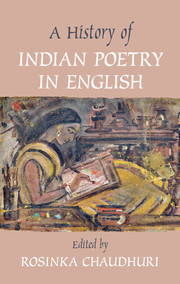Book contents
- Frontmatter
- Contents
- Contributors
- Acknowledgments
- Introduction
- SECTION I THE BROAD NINETEENTH CENTURY: INDIANS IN ENGLISH AND THE ENGLISH IN INDIA
- 1 The First Indian Poet in English: Henry Louis Vivian Derozio
- 2 English Poetry in India: The Early Years
- 3 From Albion's Exile to India's Prodigal Son: The English Poetry of Michael Madhusudan Datta (1824–1873)
- 4 Transforming Late Romanticism, Transforming Home: Women Poets in Colonial India
- 5 The Locations and Dislocations of Toru and Aru Dutt
- 6 Poetry of the Everyday: Comic Verse in the Nineteenth Century
- 7 Toru Dutt and “An Eurasian Poet”
- 8 Rabindranath Translated to Tagore: Gitanjali Song Offerings (1912)
- SECTION II PUBLISHERS, PUBLISHING HOUSES, AND THE PERIODICAL PRESS
- SECTION III POETRY: 1950–2000
- SECTION IV POETS OF THE DIASPORA
- SECTION V THE NEW MILLENNIUM POETS ON THEMSELVES
- Bibliography
- Index
6 - Poetry of the Everyday: Comic Verse in the Nineteenth Century
from SECTION I - THE BROAD NINETEENTH CENTURY: INDIANS IN ENGLISH AND THE ENGLISH IN INDIA
Published online by Cambridge University Press: 05 March 2016
- Frontmatter
- Contents
- Contributors
- Acknowledgments
- Introduction
- SECTION I THE BROAD NINETEENTH CENTURY: INDIANS IN ENGLISH AND THE ENGLISH IN INDIA
- 1 The First Indian Poet in English: Henry Louis Vivian Derozio
- 2 English Poetry in India: The Early Years
- 3 From Albion's Exile to India's Prodigal Son: The English Poetry of Michael Madhusudan Datta (1824–1873)
- 4 Transforming Late Romanticism, Transforming Home: Women Poets in Colonial India
- 5 The Locations and Dislocations of Toru and Aru Dutt
- 6 Poetry of the Everyday: Comic Verse in the Nineteenth Century
- 7 Toru Dutt and “An Eurasian Poet”
- 8 Rabindranath Translated to Tagore: Gitanjali Song Offerings (1912)
- SECTION II PUBLISHERS, PUBLISHING HOUSES, AND THE PERIODICAL PRESS
- SECTION III POETRY: 1950–2000
- SECTION IV POETS OF THE DIASPORA
- SECTION V THE NEW MILLENNIUM POETS ON THEMSELVES
- Bibliography
- Index
Summary
The Nature of the Corpus
When David Lester Richardson compiled the “British-Indian Poetry” section of his Selections from the British Poets (the first attempt to anthologize the poetry of British India) in 1840, he included no comic poetry. Despite the fact that humorous verse, satire, and parody had been the staple of the occasional verse published so regularly in newspapers and periodicals, it was only by the turn of century that comic verse was recognized to have formed a substantial and recognizable part of this corpus, meriting a named chapter in one of the first studies of Anglo-Indian literature, E. F. Oaten's A Sketch of Anglo-Indian Literature (1908). In terms of production, the poetry follows the normal pattern of prose of the same period, in that it is written by elite writers rather than the working-class; however, it is highly gendered, since – unlike prose and other forms of poetry – almost all the comic poetry that I am aware of was written by men. Analyzing a selection of poems drawn from across the nineteenth century that respond to India and/or the British presence in India in some way, this chapter scrutinizes the literary forms used by the poets, their chosen subjects and treatment of these subjects, and the ways in which their representation of British India is inflected by and sustains their perception of the exile community as distinct from both the “home” society of Britain and the colony. It also traces a chronological development within this body of work, as earlier texts – roughly speaking, those produced before the rebellion of 1857 – describe the plight of the individual seeking to come to terms with life in India, while later poems focus on the role of individuals within the larger community, identifying and censuring acts of transgression or nonconformity, and thus drawing and policing the boundaries of British society in India.
- Type
- Chapter
- Information
- A History of Indian Poetry in English , pp. 98 - 113Publisher: Cambridge University PressPrint publication year: 2016
- 1
- Cited by



